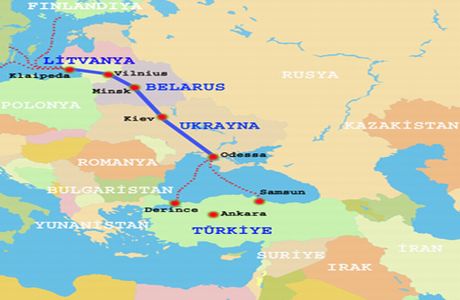Izborsky Club Says Moscow Must Block Alliance of Baltic–Black Sea States
Twenty-five years ago, Moscow’s massive nuclear weapons stockpile could not prevent the Soviet Union from falling apart, because of a conjunction of domestic problems and opposition from abroad, the influential Izborsky Club says. Today, Russia has recovered from the disasters of the 1990s; but the situation both at home and abroad is such that Russia is again at risk unless it devotes more efforts to overcoming its domestic difficulties and foreign challenges.
The Izborsky Club is made up of a group of intellectuals and writers put together by ultranationalist Soviet/Russian author Aleksandr Prokhanov to promote Russian nationalist and traditionalist views. In a recent 7,000-word report, the Bryansk section of the Izborsky Club outlines the aforementioned challenges to Russia in terms that are similar to those of the most serious critics of the Putin regime, even though the Izborsky Club itself is closely tied to the Kremlin and often has played a role in the elaboration of Kremlin policy in recent years (Ruskline.ru, February 20). That makes this report important as an indication not only of significant differences within the top elite in Moscow, but also as a marker of what policies the regime may now be considering to respond to these challenges.
Among the most interesting of its arguments concerns relations between the former Soviet West (including Ukraine and Belarus), the North Atlantic Treaty Organization (NATO), and the emerging grouping of states between the Baltic and Black Seas. Because of its historical legacy, this latter regional grouping is sometimes called the “Intermarium,” or the land between the seas (for background on this idea, see Marek Jan Chodakiewicz, Intermarium: The Land between the Black and Baltic Seas, Transaction, 2012; Jamestownfoundation.blogspot.com, August 13, 2015).
According to the Izborsky Club, Ukraine is becoming “a place des armes of the West for aggression against Russia. And in conjunction with the states of Eastern Europe (headed by Poland), a military-political union for the destruction of ‘the Russian World’ is being formed.” It is obvious, the club’s writers say, that the West is “working out technologies [political and policy tools] that can be used in Russia” and that, in fact, the West has already begun to employ them—as highlighted by the anti-regime street demonstrations in Moscow and other major Russian cities, in 2011 and 2012.
The Izborsky report says that “the minimum task” for this Baltic–Black Sea alliance of states is “a weak Russia that will play the role of a raw-materials supplier to the West.” The “maximum” goal is “the dismemberment of the country along the borders of the ethnic formations of the Russian Federation or along the borders of its federal districts.” Thus, the recent report represents a rare case of some near the Kremlin actually acknowledging that regionalism may be as much a threat to the territorial integrity of Russia as ethnic assertiveness.
Much of this danger is missed by those who insist on a sharp distinction between internal and external threats, the Izborsky Club says. In fact, in today’s world, this distinction has broken down: any internal threats inevitably are used and exacerbated by external ones, as it suggests, has happened in Ukraine. And because that is so, the club’s analysts say, it is clear that there will be new moves to “realize a plan for the establishment of the so-called ‘Intermarium,’ which [interwar Polish leader Józef] Piłsudski at one time proposed.” This will have both domestic and foreign policy implications for Russia, the writers warn.
At a minimum, Moscow must take these into consideration and, the report implies, work to block any such formation lest it lead to more problems. On the one hand, such a grouping, should it emerge, would block the restoration of good relations between Russia and Germany; and on the other, it would promote the distancing of Ukraine and ultimately Belarus from Russia, while setting the stage for transforming Russia in a pro-Western direction as well.
One of the reasons that the emergence of the Intermarium would be such a problem for Russia is that it would undermine Moscow’s leverage over many eastern NATO countries where pacifist and pro-Russian attitudes are stronger. Such attitudes inevitably limit the ability of the Western alliance to project power against Moscow, even as NATO moves to put additional forces in the Intermarium countries, the Izborsky Club says.
According to the club’s analysts, the first place where the Intermarium is likely to have an impact—indeed, where it already is having one—is in Belarus. Although few in Russia expected it, “today, there are signs that Belarus is moving along the Ukrainian path,” with the behavior of Minsk today recalling that of Kyiv 15 years ago. In both cases, the political and business elites of those countries have tried to move between East and West. Ukraine shows what can happen if this process proceeds for any length of time; and Moscow has a compelling interest in ensuring that Belarus does not try to “sit on two stools” for very long. Making sure that the Intermarium idea is not realized is a key element in any strategy to prevent that from happening.
Russia’s ability to do that in countries that have experienced Moscow’s rule is much weaker than Moscow would like. But this Izborsky Club article is an indication that Russia at least intends to try—an effort that will almost certainly involve new challenges not only for the governments of the countries in between, but also for the West as a whole.
By: Paul Goble





